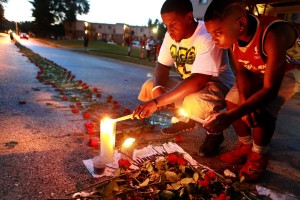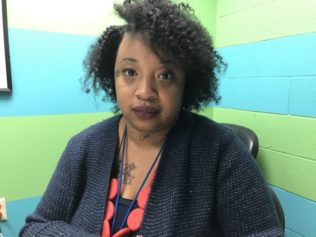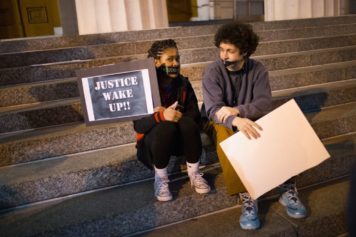
There has been an increase of more than 3,000 people registering to vote since Brown was killed by Officer Darren Wilson. In a city of just 21,000 people, that’s a significant number — more than 14 percent.
At a time when experts are predicting that an increase of just 2 or 3 percent in the number of African-American voters in possible swing states like North Carolina and Georgia could mean the difference between the Democrats holding onto the Senate or that august body switching to Republican control, an increase of 14.2 percent in Black registered voters anywhere in America shouldn’t be discounted.
Enterprising community activists have used the community unrest to encourage more voter registration over the past two months. The result is that 4,839 people in St. Louis County have registered to vote since the shooting and 3,287 of them live in Ferguson. Though the St. Louis County Election Board doesn’t record the race of eligible voters, since Ferguson is two-thirds Black most observers believe the surge is due to local efforts in the African-American community.
Much has been written about the racial imbalance in Ferguson’s political structure and police department. Due to white flight in recent years, five of the city’s six City Council members are white, as is the mayor, while the population is 67 percent Black. In the police department, of 53 officers just five are Black, according to the police chief, who has said the department has had a difficult time recruiting more Black officers.
A state report on racial profiling obtained by Buzzfeed revealed that 86 percent of all traffic stops and 92 percent of all arrests in the town are of Black residents — though Black residents stopped by police are less likely to be carrying contraband than white residents are.
“It’s a great move when people come out and register in mass like that,” Anthony Bell, St. Louis 3rd Ward committeeman, told USA Today, which first reported on the voter registration surge. “They are sending a signal that we want a change. It doesn’t give justice to the Michael Brown family, but it will in the future give justice to how the administration is run in a local municipality like Ferguson.”
The biggest issue on next month’s ballot will be the race for county executive of St. Louis County.
Bell is one of the people who gets credit for the surge in registrations. He was one of the residents who saw Brown’s body laying on a Ferguson street for hours. and while protesting the killing Bell got out a clipboard and started registering people. He later set up a booth a few blocks from the shooting scene, according to USA Today.
There has been a decided interest in learning how to register voters, as groups like the NAACP and League of Women Voters have taken classes and local residents have scooped up stacks of registration cards, according to Rita Days, St. Louis County director of elections, who has been fielding the calls.
Of course, registering voters is one thing. The recent problem in Ferguson has been getting them to the polls.
In the April local elections, only 1,484 of the 12,096 registered voters in Ferguson cast ballots, Days said.
“The apathy regarding voters is rampant in this county,” she told USA Today. “I mean if we get 10 or 15 (percent of registered voters to vote), that’s good.”
“We want to have a big rally,” community activist Anthony Shahid said. “You have to get people excited to make people understand that this is history. And it is history — no different than when President Obama came into office.”
Voters must be registered by Wednesday to vote on Nov. 4.
“It could completely change the political landscape, the power structure, the decision making,” said Anthony Gray, an attorney for Brown’s family. “The service to the African-American community would almost quadruple because they would be viewed as a credible and legitimate voting block.”


